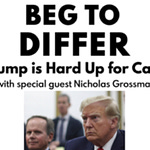Ken White (Popehat) joins the panel to consider the wisdom of the Manhattan DA's Trump indictment, as well as DeSantis joining the surrender caucus, SVB, and a low moment at Stanford Law.
highlights/lowlights
Linda’s:
https://www.jamesgmartin.center/2023/03/law-school-mismatch-is-worse-than-we-thought/
Damon's:













